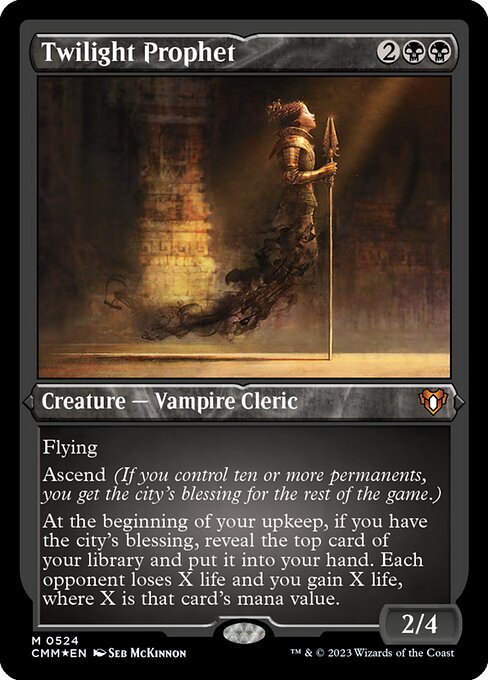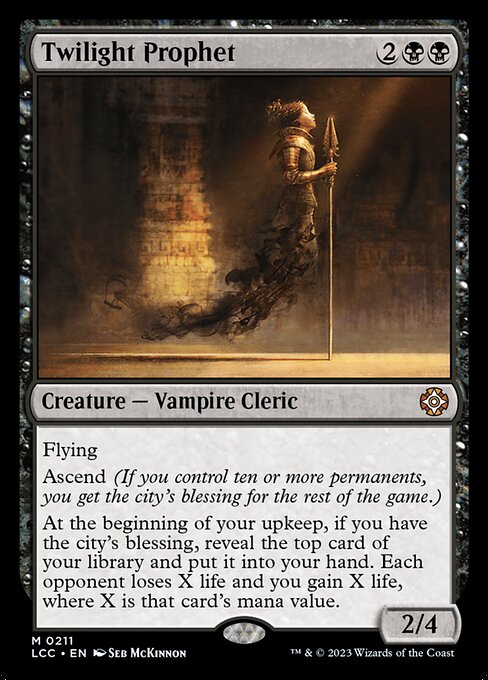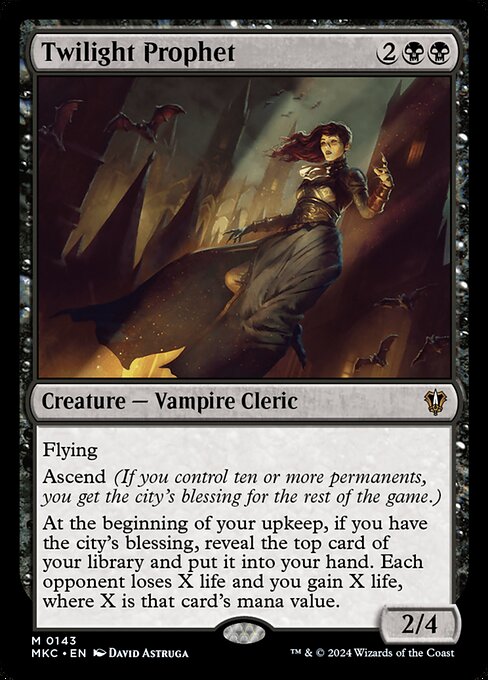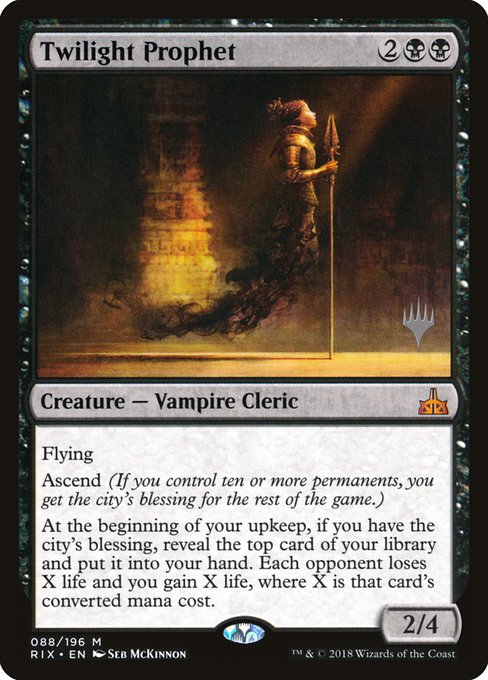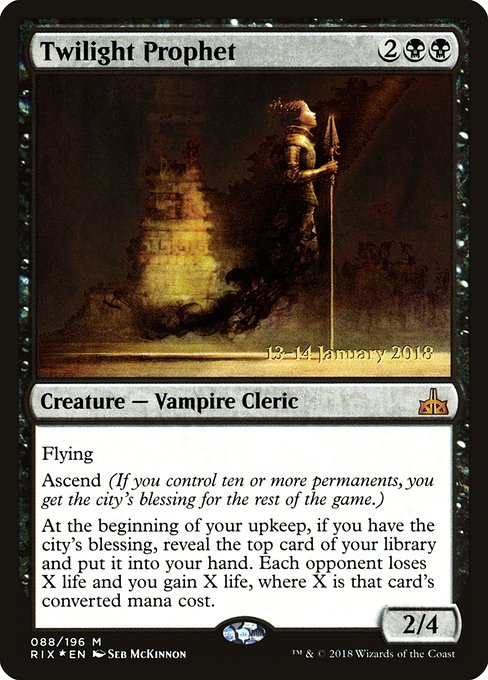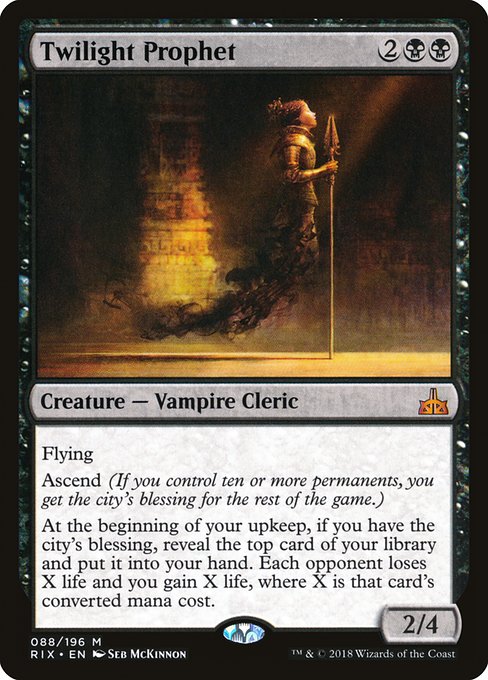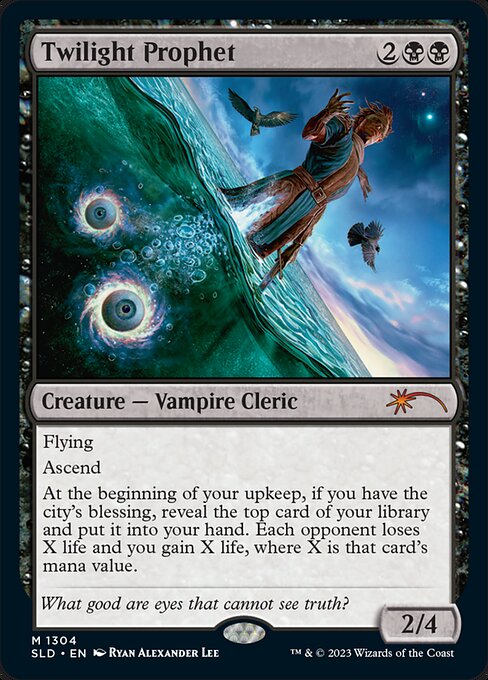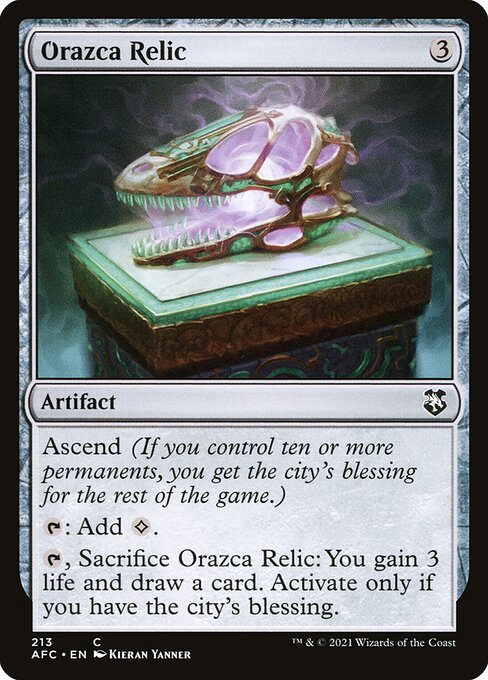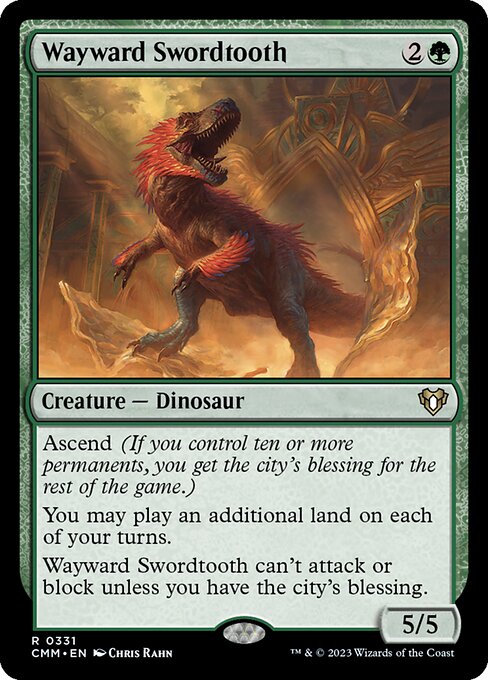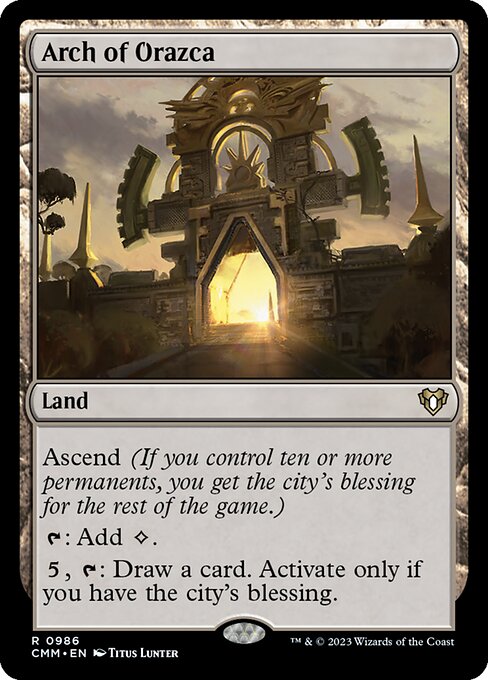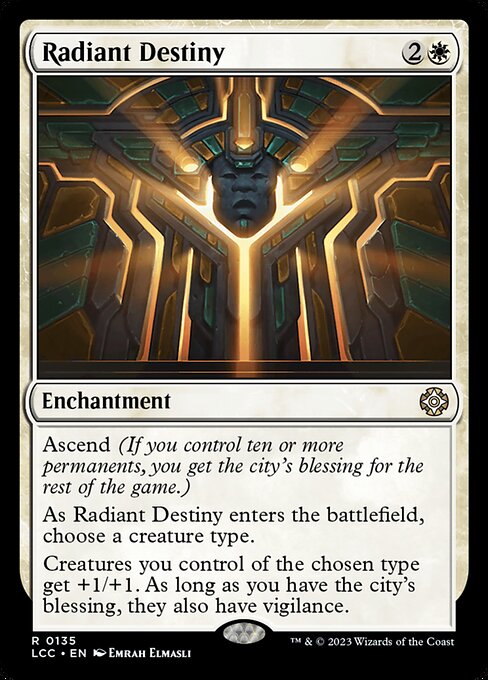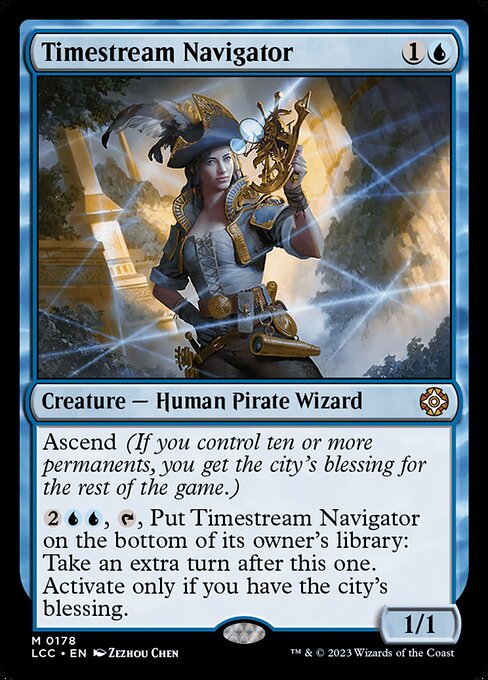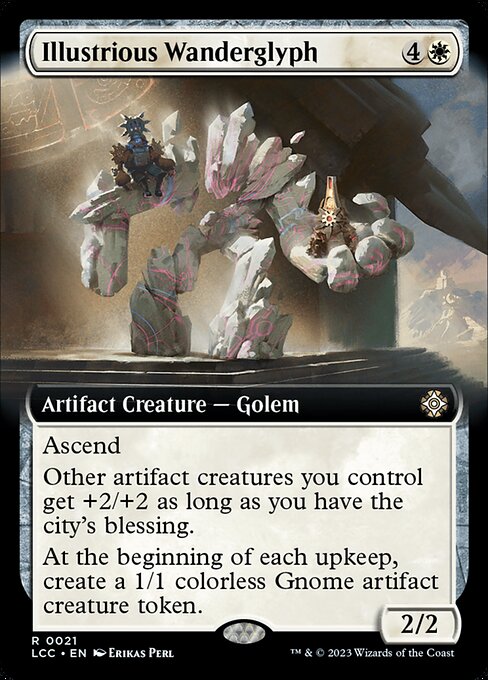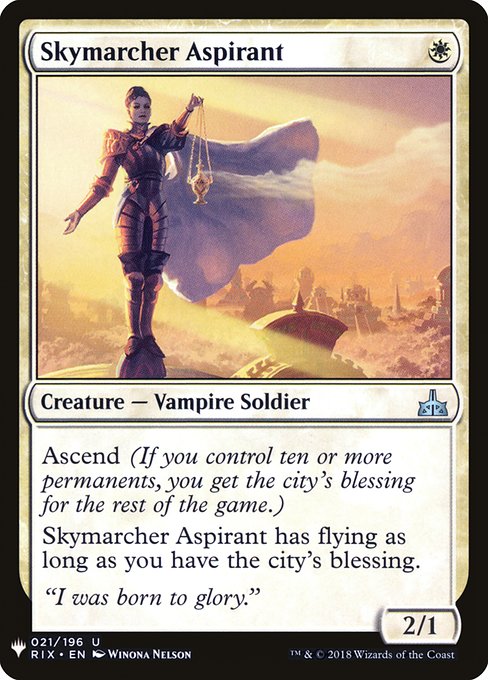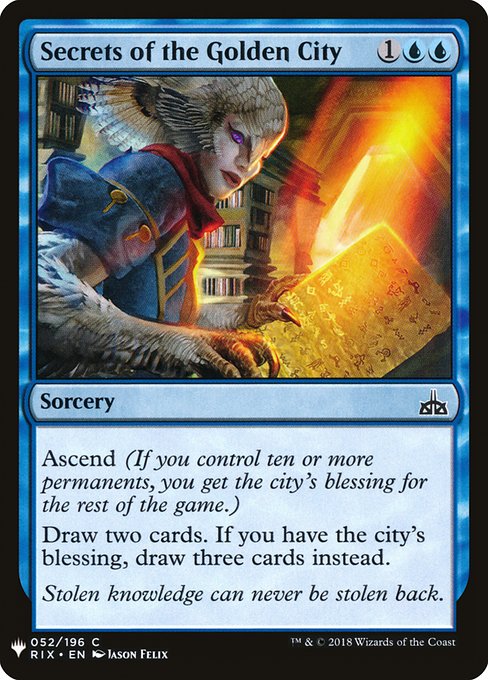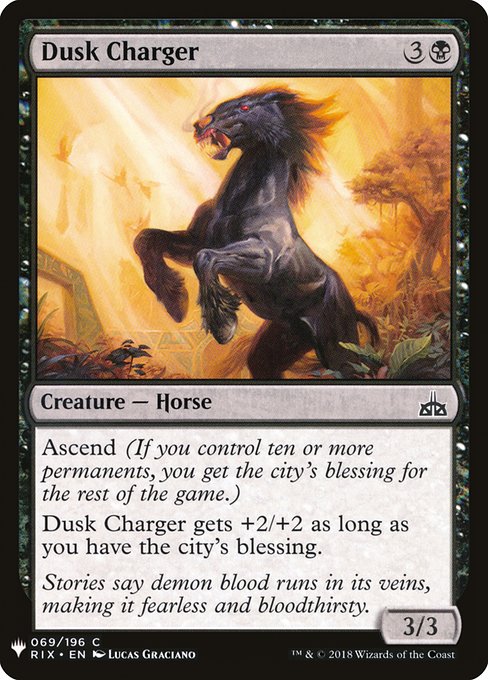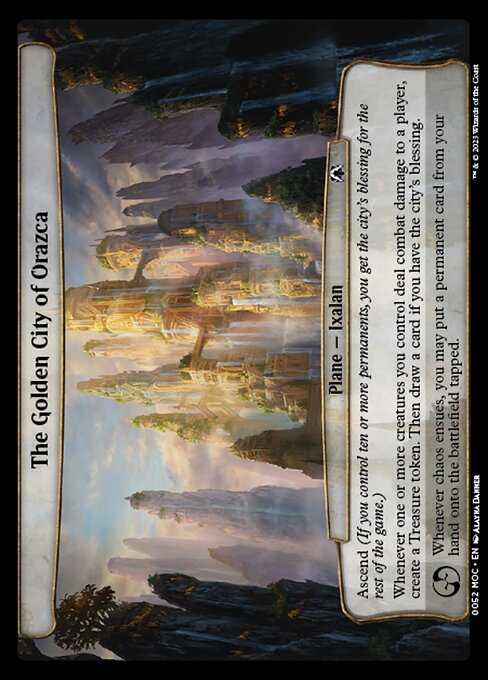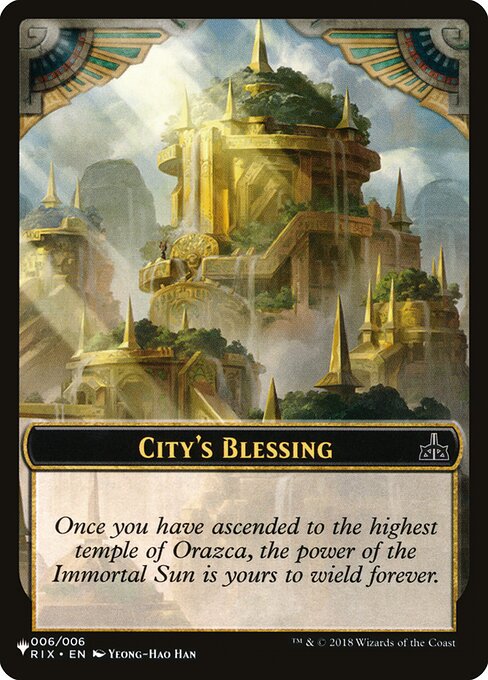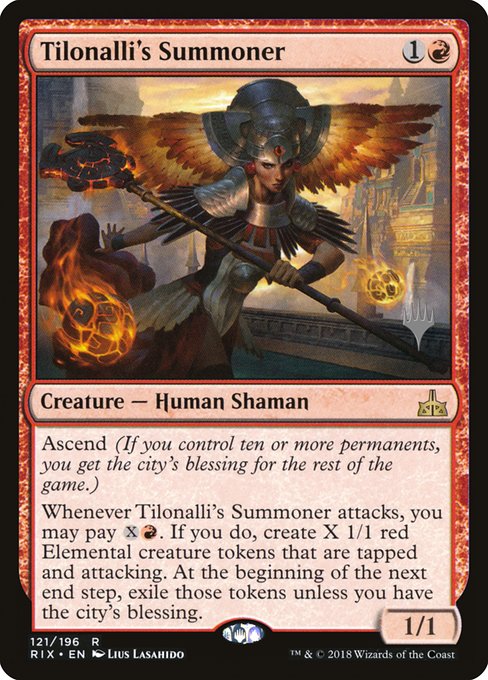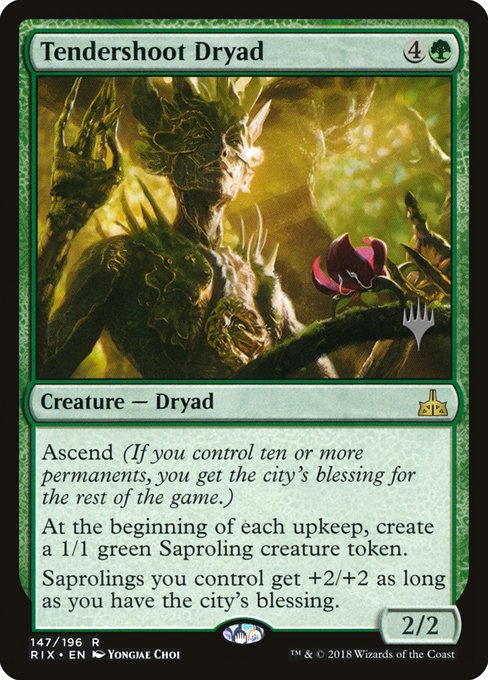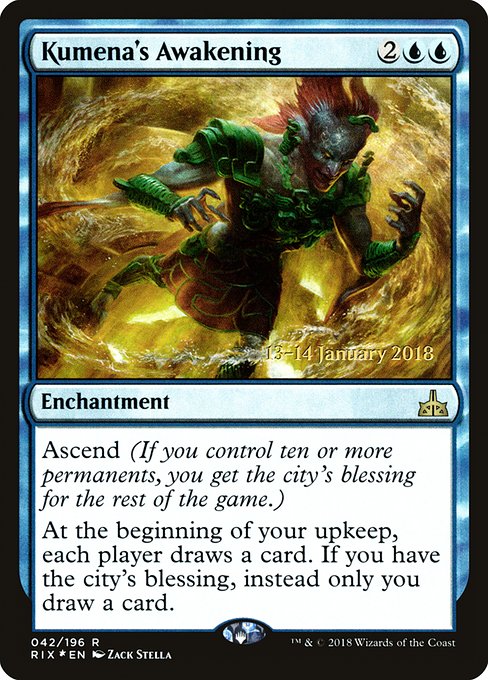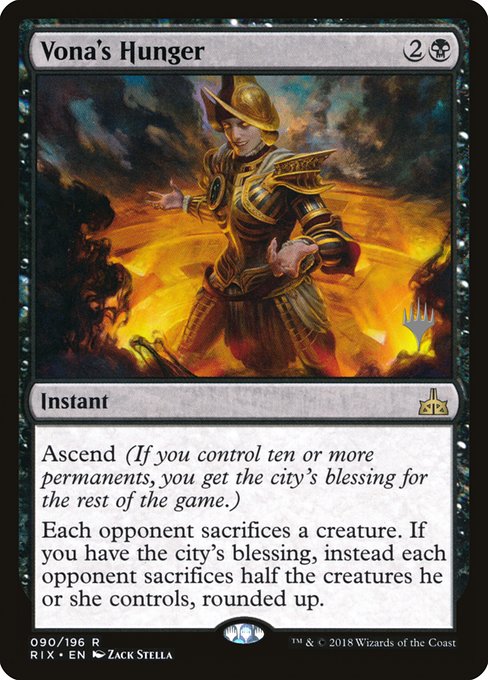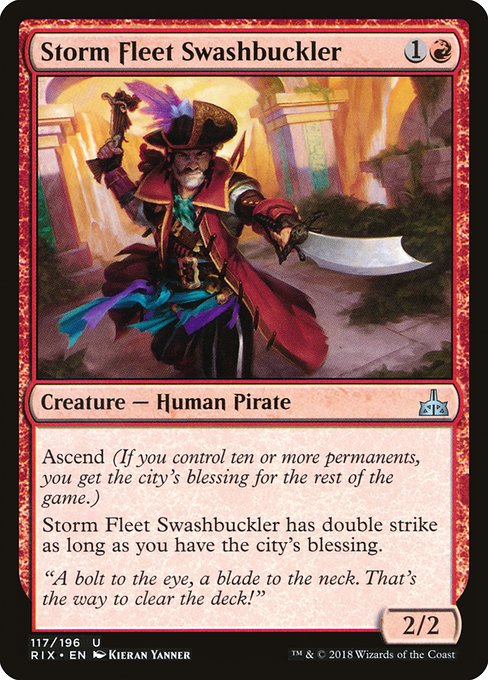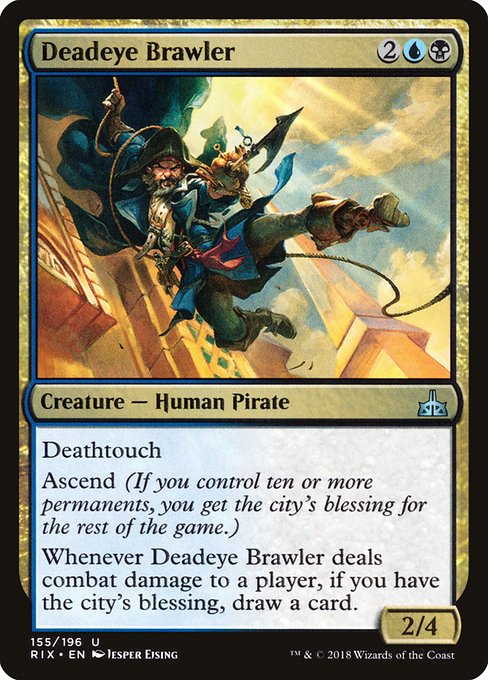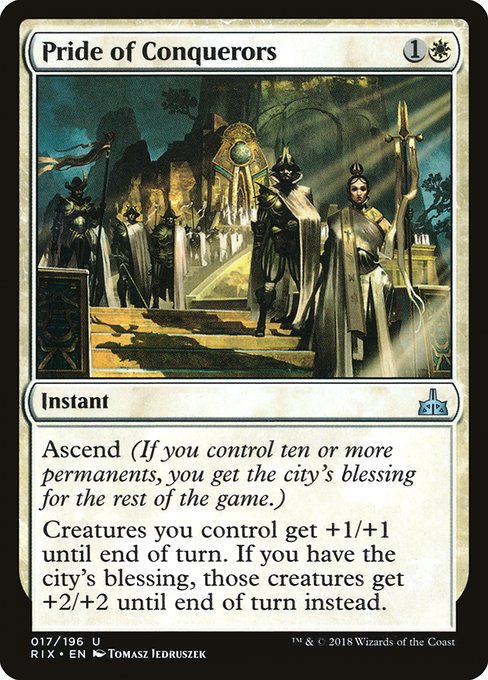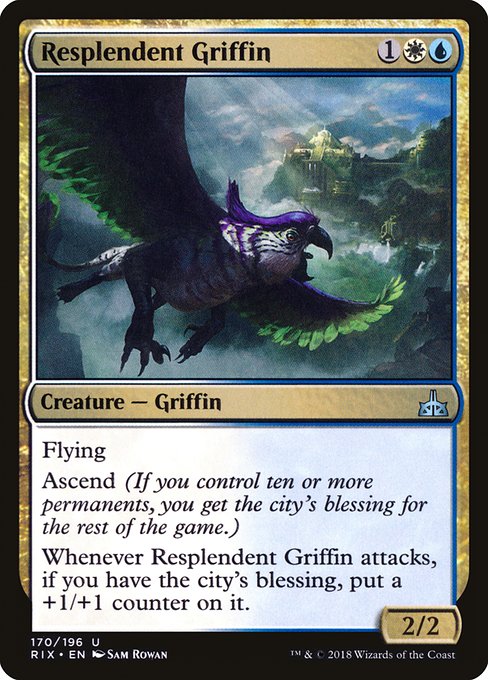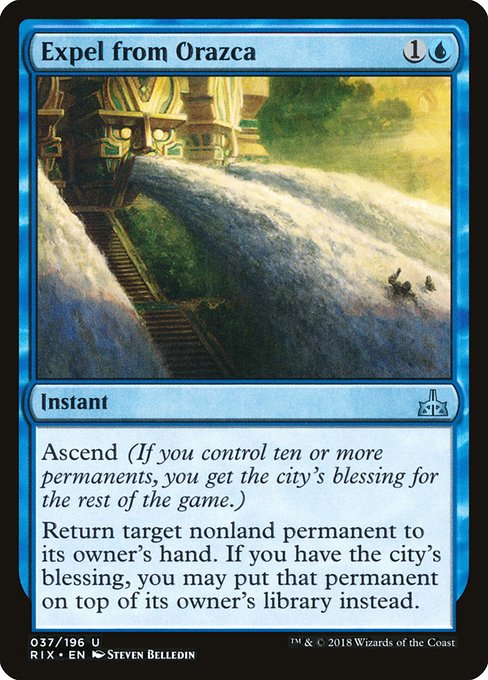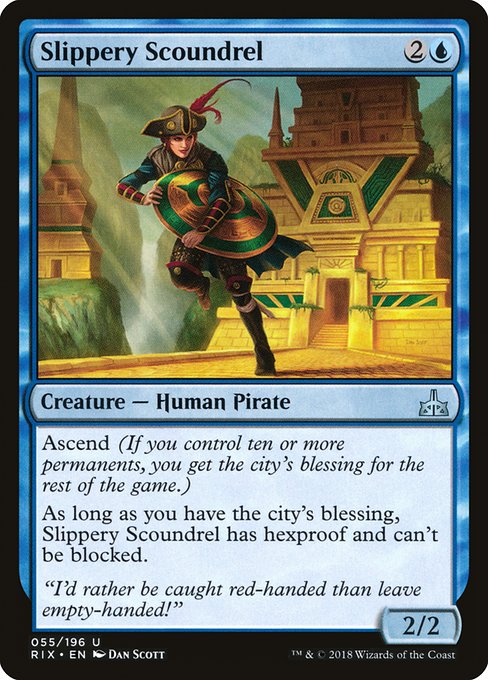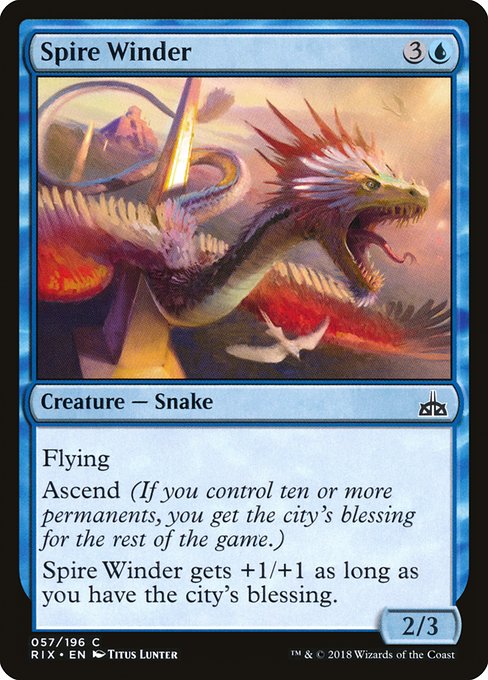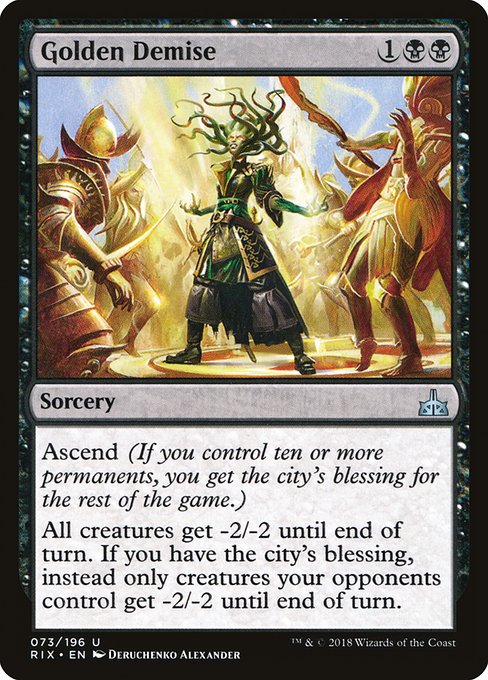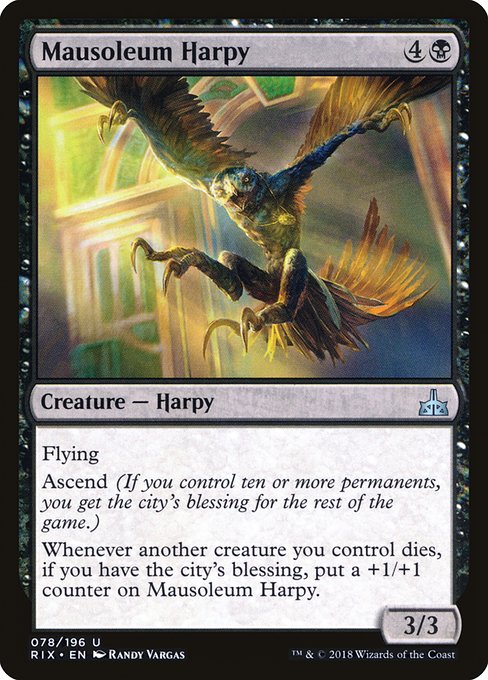Twilight Prophet
Creature — Vampire Cleric
Flying
Ascend (If you control ten or more permanents, you get the city's blessing for the rest of the game.)
At the beginning of your upkeep, if you have the city's blessing, reveal the top card of your library and put it into your hand. Each opponent loses X life and you gain X life, where X is that card's mana value.
Ascend (If you control ten or more permanents, you get the city's blessing for the rest of the game.)
At the beginning of your upkeep, if you have the city's blessing, reveal the top card of your library and put it into your hand. Each opponent loses X life and you gain X life, where X is that card's mana value.
2/4
standard
future
historic
gladiator
pioneer
explorer
modern
legacy
pauper
vintage
penny
commander
brawl
historicbrawl
alchemy
paupercommander
duel
oldschool
premodern
Rulings
Ascend on a permanent isn’t a triggered ability and doesn’t use the stack. Players can respond to a spell that will give you your tenth permanent, but they can’t respond to getting the city’s blessing once you control that tenth permanent. This means that if your tenth permanent is a land you play, players can’t respond before you get the city’s blessing.
A permanent is any object on the battlefield, including tokens and lands. Spells and emblems aren’t permanents.
In a Two-Headed Giant game, Twilight Prophet’s last ability causes the opposing team to lose twice X life and you gain X life.
Once you have the city’s blessing, you have it for the rest of the game, even if you lose control of some or all of your permanents. The city’s blessing isn’t a permanent itself and can’t be removed by any effect.
If you control ten permanents but don’t control a permanent or resolving spell with ascend, you don’t get the city’s blessing. For example, if you control ten permanents, lose control of one, then cast Golden Demise, you won’t have the city’s blessing and the spell will affect creatures you control.
The converted mana cost of a split card, such as cards with aftermath from the Amonkhet block, is based on the combined mana cost of its two halves.
If your tenth permanent enters the battlefield and then a permanent leaves the battlefield immediately afterwards (most likely due to the “Legend Rule” or due to being a creature with 0 toughness), you get the city’s blessing before it leaves the battlefield.
If the revealed card doesn’t have a mana cost (because it’s a land card, for example), its converted mana cost is 0.
Some cards have triggered abilities with an intervening “if” clause that checks whether you have the city’s blessing. These are worded “[Trigger condition], if you have the city’s blessing, [effect].” You must already have the city’s blessing in order for these abilities to trigger; otherwise they do nothing. In other words, there’s no way to have the ability trigger if you don’t have the city’s blessing, even if you intend to get it in response to the triggered ability.
If the mana cost of the revealed card includes , X is considered to be 0.
If you cast a spell with ascend, you don’t get the city’s blessing until it resolves. Players may respond to that spell by trying to change whether you get the city’s blessing.
A permanent is any object on the battlefield, including tokens and lands. Spells and emblems aren’t permanents.
In a Two-Headed Giant game, Twilight Prophet’s last ability causes the opposing team to lose twice X life and you gain X life.
Once you have the city’s blessing, you have it for the rest of the game, even if you lose control of some or all of your permanents. The city’s blessing isn’t a permanent itself and can’t be removed by any effect.
If you control ten permanents but don’t control a permanent or resolving spell with ascend, you don’t get the city’s blessing. For example, if you control ten permanents, lose control of one, then cast Golden Demise, you won’t have the city’s blessing and the spell will affect creatures you control.
The converted mana cost of a split card, such as cards with aftermath from the Amonkhet block, is based on the combined mana cost of its two halves.
If your tenth permanent enters the battlefield and then a permanent leaves the battlefield immediately afterwards (most likely due to the “Legend Rule” or due to being a creature with 0 toughness), you get the city’s blessing before it leaves the battlefield.
If the revealed card doesn’t have a mana cost (because it’s a land card, for example), its converted mana cost is 0.
Some cards have triggered abilities with an intervening “if” clause that checks whether you have the city’s blessing. These are worded “[Trigger condition], if you have the city’s blessing, [effect].” You must already have the city’s blessing in order for these abilities to trigger; otherwise they do nothing. In other words, there’s no way to have the ability trigger if you don’t have the city’s blessing, even if you intend to get it in response to the triggered ability.
If the mana cost of the revealed card includes , X is considered to be 0.
If you cast a spell with ascend, you don’t get the city’s blessing until it resolves. Players may respond to that spell by trying to change whether you get the city’s blessing.
Rulings
Ascend on a permanent isn’t a triggered ability and doesn’t use the stack. Players can respond to a spell that will give you your tenth permanent, but they can’t respond to getting the city’s blessing once you control that tenth permanent. This means that if your tenth permanent is a land you play, players can’t respond before you get the city’s blessing.
A permanent is any object on the battlefield, including tokens and lands. Spells and emblems aren’t permanents.
In a Two-Headed Giant game, Twilight Prophet’s last ability causes the opposing team to lose twice X life and you gain X life.
Once you have the city’s blessing, you have it for the rest of the game, even if you lose control of some or all of your permanents. The city’s blessing isn’t a permanent itself and can’t be removed by any effect.
If you control ten permanents but don’t control a permanent or resolving spell with ascend, you don’t get the city’s blessing. For example, if you control ten permanents, lose control of one, then cast Golden Demise, you won’t have the city’s blessing and the spell will affect creatures you control.
The converted mana cost of a split card, such as cards with aftermath from the Amonkhet block, is based on the combined mana cost of its two halves.
If your tenth permanent enters the battlefield and then a permanent leaves the battlefield immediately afterwards (most likely due to the “Legend Rule” or due to being a creature with 0 toughness), you get the city’s blessing before it leaves the battlefield.
If the revealed card doesn’t have a mana cost (because it’s a land card, for example), its converted mana cost is 0.
Some cards have triggered abilities with an intervening “if” clause that checks whether you have the city’s blessing. These are worded “[Trigger condition], if you have the city’s blessing, [effect].” You must already have the city’s blessing in order for these abilities to trigger; otherwise they do nothing. In other words, there’s no way to have the ability trigger if you don’t have the city’s blessing, even if you intend to get it in response to the triggered ability.
If the mana cost of the revealed card includes , X is considered to be 0.
If you cast a spell with ascend, you don’t get the city’s blessing until it resolves. Players may respond to that spell by trying to change whether you get the city’s blessing.
A permanent is any object on the battlefield, including tokens and lands. Spells and emblems aren’t permanents.
In a Two-Headed Giant game, Twilight Prophet’s last ability causes the opposing team to lose twice X life and you gain X life.
Once you have the city’s blessing, you have it for the rest of the game, even if you lose control of some or all of your permanents. The city’s blessing isn’t a permanent itself and can’t be removed by any effect.
If you control ten permanents but don’t control a permanent or resolving spell with ascend, you don’t get the city’s blessing. For example, if you control ten permanents, lose control of one, then cast Golden Demise, you won’t have the city’s blessing and the spell will affect creatures you control.
The converted mana cost of a split card, such as cards with aftermath from the Amonkhet block, is based on the combined mana cost of its two halves.
If your tenth permanent enters the battlefield and then a permanent leaves the battlefield immediately afterwards (most likely due to the “Legend Rule” or due to being a creature with 0 toughness), you get the city’s blessing before it leaves the battlefield.
If the revealed card doesn’t have a mana cost (because it’s a land card, for example), its converted mana cost is 0.
Some cards have triggered abilities with an intervening “if” clause that checks whether you have the city’s blessing. These are worded “[Trigger condition], if you have the city’s blessing, [effect].” You must already have the city’s blessing in order for these abilities to trigger; otherwise they do nothing. In other words, there’s no way to have the ability trigger if you don’t have the city’s blessing, even if you intend to get it in response to the triggered ability.
If the mana cost of the revealed card includes , X is considered to be 0.
If you cast a spell with ascend, you don’t get the city’s blessing until it resolves. Players may respond to that spell by trying to change whether you get the city’s blessing.
Your collection? Your decks?
Want to manage your collection and/or create decks?
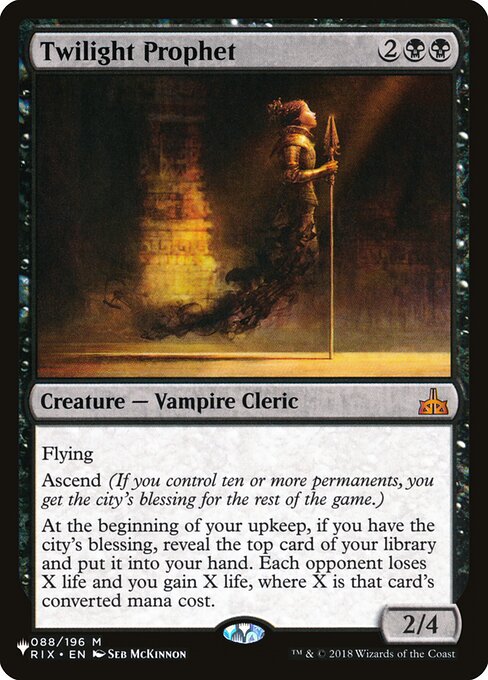

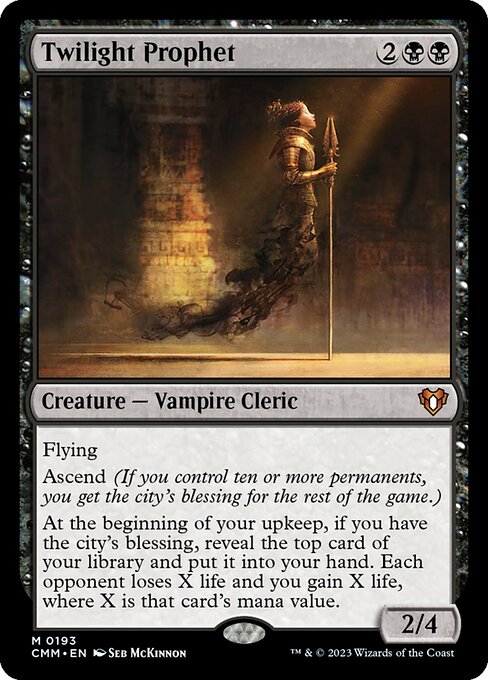
 0
0
 1.51€
1.51€
